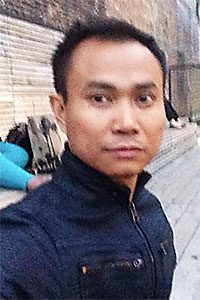
At the beginning of a relationship, an unknown or ambiguous thing about a person whom we are attracted to usually excites us. Once the relationship gets more serious, we usually need to know the unknown and understand the ambiguity before committing ourselves further, let's say, to a marriage.
That is the notion of most Thais in the modern era. We make our own choices based on how much we know and like about a person. An arranged marriage, by parents, to someone whom we know little about is rare and something from the past. But the Aug 7 referendum on the draft charter will, ironically, be a throwback to the era of Thailand's forced marriages.
With less than a month to go before the referendum, it is doubtful how much the average Thai understands about the 279 sections of the draft charter and how much we know about its implications for the future of the country and on our lives.

Surasak Glahan is deputy oped pages editor, Bangkok Post.
Going through the entire draft is a painful and time-consuming process for ordinary Thais. Additionally, when voters go to the polls, they will also be asked to make a decision on an "extra question" that takes up four lines on the ballot paper.
Many have criticised the question over its complexity. Civil society groups who run the Prachamati website, which provides public information on the referendum, recently held a competition asking readers to "rewrite and simplify" the extra question on its Facebook page.
"Do you agree or disagree that, in order to reform the country and ensure continuity of the national strategic plan, there should be a transitional governing provision during the first five years from the date that the first parliament is formed under this constitution, and a joint parliamentary meeting should be allowed to agree on which person deserves to be appointed as prime minister?"
That is my informal English translation of the annexed question.
"Do you understand it? Please simplify it, taking out unnecessary wording and keeping only the key points understandable to most people," the Prachamati Facebook page challenges its readers. In essence, voters will be asked to decide whether unelected senators can choose a non-elected prime minister for the five-year transition period to full democracy.
The competition is a vivid reflection of how poorly the state has informed the public about the draft charter, let alone allowing open debate on its pros and cons.
Instead of providing voters with a simple, comprehensive explanation about the charter and its implications, the Office of the Election Commission (EC) and the Constitution Drafting Committee (CDC) have been increasingly suppressing charter critics. The regime has also imposed punitive restrictions on those who just want to express different views.
The crackdown is getting worse. Groups of students and activists have been arrested and detained for distribution or possession of referendum campaign materials. More recently, the police raided the offices of the Prachatai news website on Tuesday searching for documents that violate the referendum law. Suppression seems to have overridden the campaign to inform the public about the charter.
Instead of cracking down on opposing views, the EC and the CDC should allow all sides to openly debate what they think about the charter that will give sweeping power to the military regime, judiciary and independent agencies over future elected governments.
The charter will enable the National Council for Peace and Order to handpick a 250-member Senate with six seats reserved for armed forces chiefs. Those who oppose this idea should not be prohibited from making their voices heard.
Voters need to hear different views on the implications of the charter's 20-year national development plan that will cripple future governments' abilities to make decisions and adjust to changing circumstances.
The state is also keeping voters in the dark over the aftermath of the referendum. Will the charter wipe out all current political parties and rewrite a new political landscape? Will it put an end to the 30-baht health scheme that 48 million people rely on? What alternatives will we have if the draft is not endorsed?
On referendum day, voters are likely to have only a limited understanding and many questions.
As in the old days of forced marriages, voters may no longer want to be just "good children", dutifully obeying their parents and risking their future by saying "yes, I do" to something they don't know enough about.
